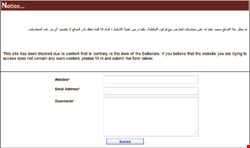


Earlier this month, researchers from the Citizen Lab at the University of Toronto's Munk School of Global Affairs reported that a number of internet users in Oman who use the Omantel ISP service had their access to web content restricted by Indian censorship measures. This filtering happens because of the way in which different countries connect to the web. In some countries, web content is not delivered directly to the user from the host country – instead, it has to transit through a third country before being delivered to the user's computer.
Although there have been dozens of cases in which specific countries block domestic or foreign internet content they don't want their citizens to view – either because it's critical of government policies, or it violates their own laws and regulations – it's very rare to see one country’s internet access restricted due to transit and peering agreements. (Note: transit agreements are those in which ISPs allow data from another ISP to move through their infrastructure, whereas for peering agreements, ISPs agree to station hardware in the same location for a mutually beneficial transfer of data.)
In this latest case, the problem appears to be a peering agreement between the Indian ISP Bharti Airtel and its customer, Omantel. The latter engaged in peering agreements with a provider that filtered the connection used to peer, thus transferring the content filtration to Omantel’s customers. India has a history of struggles over the balance between its security concerns and online freedom. Indeed, a set of regulations went into effect in April 2011 and caused international suspicion about the lack of transparency in handling content censorship.
Citizen Lab revealed they had carried out a number of tests in late June of this year, both in collaboration with Omani internet users, and also remotely via proxy servers. Interestingly, they found there was variability in the filtering behavior, possibly because of alterations in the flow of internet traffic or court orders. Indeed, the India Centre for Internet and Society, engaged with concerns of internet censorship and related policies in India, recently reported a new ruling requiring Indian ISPs to block pirated content on a per-URL basis, rather than restricting access to an entire site.
Hardly an Isolated Incident
Admittedly, Oman is no ‘white knight’ when it comes to internet freedom. The country is guilty of operating its own, strict national internet filtering system, in both Arabic and English. Should a user in Oman attempt to access content that is blocked by local authorities, they will be redirected to a page that states that the website “contains content contrary to the laws of the Sultanate” (see Figure 1).
However, should users attempt to access content that is blocked by India, they will receive the message “This website/URL has been blocked until further notice either pursuant to Court orders or on the Directions issued by the Department of Telecommunications”. Of course, the Department of Telecommunications refers to India's own telco regulations agency (see Figure 2).
According to Ars Technica, among the affected websites are a number of Pakistani and Indian entertainment sites, as well as dozens of file-sharing websites, political blogs, and even the San Francisco-based IndyBay news website. Ron Deibert, director of Citizen Lab, said in an interview with Ars Technica that the discovery was further evidence of the way in which governments can mess with the openness of the internet around the world. “In Oman, we have this perverse situation in which that country’s citizens are subject to Indian censorship”, Deibert observed.
Citizen Lab researchers concluded that “the application of filters in India restricts Internet users in Oman from accessing content, potentially even content produced in Oman itself, as a result of actions taken for domestic purposes within India. Users in Oman did not consent to this blocking, are left with little recourse for challenging these actions, and have limited means of accessing this content, which may or may not be in violation of Omani regulations. Combined with the significant filtering implemented by Omantel itself, this practice places Internet users in Oman behind multiple layers of national-level filtering”.
The Lab noted in its report that similar behavior had previously been observed in Uzbekistan. In this case, which occurred in 2004, content filtering on an Uzbekistani ISP was seen to closely match Chinese content filtering. It turned out that the Uzbekistani ISP was purchasing its connectivity service directly from China Telecom.
The Electronic Frontier Foundation is a think tank very concerned with free speech and privacy issues, and has published extensively on network filtering and its negative effects. Jillian York, EFF's director for international freedom of expression, said that censorship measures taken by one country regarding online content often affected users of other countries.
“There are various reasons why this can occur”, York noted. “Upstream filtering is just one of them. Others might include the application of legislation such as SOPA, which, had it been passed, would have granted the US government various powers through which they could censor foreign content.” The think tank regularly expresses its disappointment with governments, ISPs, and content providers that engage in internet filtering, and it frequently highlights international issues over freedom of speech.
The OpenNet Initiative – a collaborative partnership of three institutions (the Citizen Lab at the Munk School of Global Affairs, University of Toronto; the Berkman Center for Internet & Society at Harvard University; and the SecDev Group in Ottawa) – is another think tank aimed at investigating and analyzing internet filtering and surveillance practices. According to the ONI, India and Oman take a different approach to online content censorship. In India, censorship tends to focus on file sharing/multimedia sites relating to Indian culture and security, in addition to internet tools-related content, while in Oman, authorities are more focused on censoring pornographic material, especially gay and lesbian sites, and also anonymizing or proxy circumvention tools.
Researchers at the ONI have come across a number of ‘upstream filtering’ incidents in the past. One of the most notable cases was in Kyrgyzstan, where researchers found that the country was ‘cyberlocked’ and dependent on purchasing bandwidth from Kazakhstan – well known for its internet shut downs – and Russia. More details on this case are available on the ONI website.
Monitoring 'Big Brother'
In recent years, internet censorship has been an increasing focus of scholarly research. At Harvard’s Berkman Center for Internet and Society, the Herdict Web is a natural progression from the OpenNet Initiative.
By using crowdsourcing to present a real-time view of the experiences of users around the globe, one can use Herdict to see if others are reporting the same phenomenon, providing a better sense of potential reasons why the site is inaccessible.
As previously mentioned, upstream filtering is rare, but that shouldn’t provide an excuse to overlook this phenomenon. Monitoring tools, such as Herdict, can help give internet users a better sense of the prevalence of online censorship.
Jean-Loup Richet is research associate at the Canada Research Chair in Identity, Security and Technology at the University of Montréal. He graduated from the French National Institute of Telecommunications, Telecom Business School, and holds a research master’s from IAE/HEC Paris. A member of the post-graduate committee of the British Society of Criminology, his research interests include cybercrime, internet censorship and information systems security. Richet has been a speaker at several national and international conferences, and has published articles in academic and trade journals.